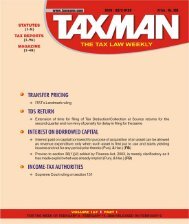CPT V24P7-Art1 (Content).pmd - Taxmann
CPT V24P7-Art1 (Content).pmd - Taxmann
CPT V24P7-Art1 (Content).pmd - Taxmann
You also want an ePaper? Increase the reach of your titles
YUMPU automatically turns print PDFs into web optimized ePapers that Google loves.
Landmark Rulings<br />
(c) Further, return is filed within due date<br />
as specified under section 139(4).<br />
686<br />
If loss not claimed in original return, it<br />
can’t be claimed through revised return<br />
either<br />
In Karnataka Forest Development Corp. Ltd.<br />
v. CIT [2012] 23 taxmann.com 314 (Bang. -<br />
Trib.), the assessee filed its return of income<br />
declaring certain income. Thereafter, a revised<br />
return was filed under section 139(5) declaring<br />
losses. During the assessment proceedings, the<br />
AO observed that the revised return filed by<br />
the assessee under section 139(5) was not valid.<br />
He, accordingly, computed the taxable income<br />
of the assessee. Assessee filed an appeal before<br />
the CIT(A) challenging the non-consideration<br />
of the revised return. The CIT(A) held that the<br />
revised return was return which should have<br />
been filed within the time specified under<br />
section 139(3) and, therefore, the loss return<br />
filed beyond the time-limit prescribed under<br />
section 139(3) was null and void.<br />
The Tribunal held in favour of revenue - It was<br />
held that from a literal reading of section<br />
139(3), it is seen that where any person claims<br />
a loss for any previous year and also claims<br />
that the loss or any part thereof should be<br />
carried forward, then the return has to be<br />
furnished within the time allowed under subsection<br />
(1) of section 139. In the instant case,<br />
the original return filed by the assessee was<br />
under section 139(1), but there was no claim<br />
of loss or loss to be carried forward. Therefore,<br />
it cannot be treated as a return under section<br />
139(3). Having filed the original return of income<br />
under section 139(1), the assessee cannot later<br />
on file the revised return of income claiming<br />
the loss on the ground that it was discovered<br />
subsequently as the losses for previous years<br />
must be available with assessee at the time of<br />
filing of return under section 139(1). Therefore,<br />
the argument of CIT(A) that when the assessee<br />
August 1 to 15, 2012 u TAXMANN’S CORPORATE PROFESSIONALS TODAY u Vol. 24 u 66<br />
}<br />
was claiming the loss for the relevant assessment<br />
year and preceeding years relevant to AY,<br />
then the assessee was required to file the return<br />
under section 139(3), was to be accepted.<br />
Therefore, the revised return filed under section<br />
139(5) could not be accepted and had to be<br />
treated as null and void.<br />
No HRA exemption to employee on ‘rent<br />
reimbursed’ to employer for rent-free<br />
accommodation<br />
In Dy. CIT v. Kuldeep D. Kaura [2012] 23<br />
taxmann.com 225 (Ahmedabad - Trib.), assesseeemployee<br />
was living in a house provided as<br />
rent free accommodation by his employer. This<br />
house was taken on lease by his employer.<br />
Subsequently, employee reimbursed the rent<br />
of accommodation to the employer and he<br />
also received HRA for such reimbursement.<br />
Accordingly, the value of rent free<br />
accommodation came out to be ‘nil’ under<br />
section 17(2) as assessee was reimbursing full<br />
amount of rent to the employer. However,<br />
simultaneously, the assessee also claimed<br />
exemption under section 10(13A) for house<br />
rent allowance received in respect of rent<br />
reimbursed to employer. AO opined that<br />
exemption for HRA would amount to double<br />
benefit since assessee had claimed ‘nil’ value<br />
of rent free accommodation. CIT(A) allowed<br />
assessee’s appeal.<br />
The Tribunal held in favour of revenue - It was<br />
held that assessee was getting double benefits,<br />
i.e., free use of accommodation provided by<br />
the employer which was taken by the employer<br />
on lease and in addition to this the assessee<br />
was also getting HRA. However, against these<br />
two benefits, assessee was making payment of<br />
rent in respect of one property. Hence, as<br />
assessee was getting double benefit, one had<br />
to be taxed in any case because only one payment<br />
was being made by the assessee on account<br />
of rent. Therefore, as the perquisite value of<br />
}











![“FORM NO. 3CEB [See rule 10E] Report from an ... - Taxmann](https://img.yumpu.com/45480232/1/190x245/form-no-3ceb-see-rule-10e-report-from-an-taxmann.jpg?quality=85)





